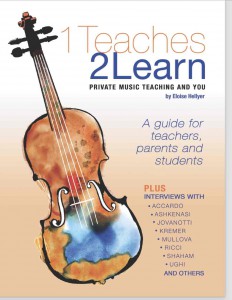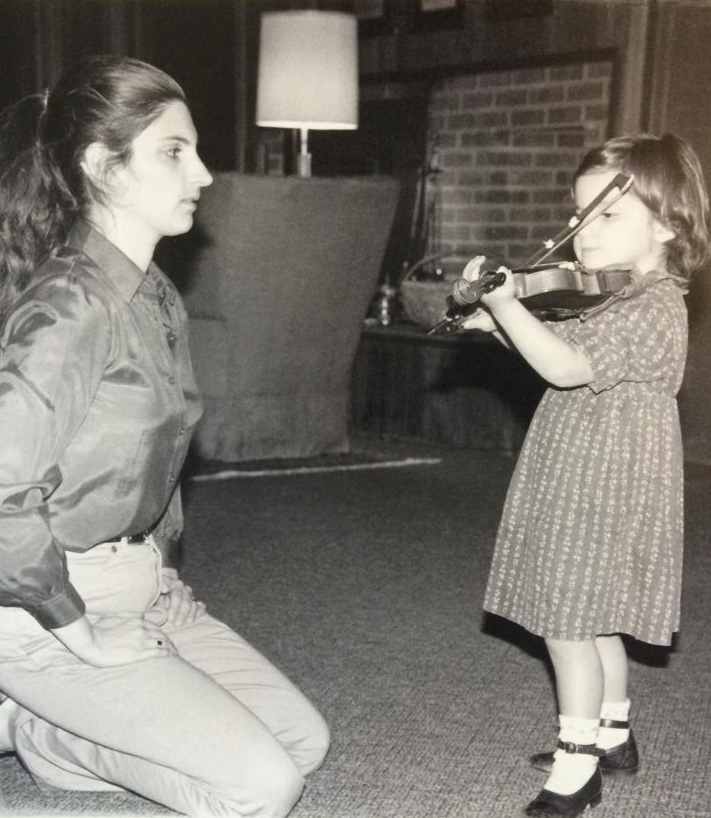Balky, Distracted, Whiny Students —a Little Perspective
“I have a very talented 7-year-old student whose musician mother helps her practice and makes sure she listens to her music. Our goal is to get through Minuet 2 without stopping, but she whines a lot and gets very easily distracted. I’m wondering if this is an attention issue. When her mother asks me why her child is making mistakes on everything they studied at home, I don’t know what to tell her. What to do?”
What to do indeed. An excellent question from a highly qualified teacher. Here is what my many decades of teaching Minuet 2 have taught me.
My epiphany came many years ago. My older daughter was also very talented. I have never seen a child so young show such extreme powers of concentration. For example, when she was 5, she was playing the piano for a class of school students (the teachers were thrilled to have her perform for various classes in her school – their idea, not mine), when a very loud school bell signifying the end of the hour went off in the school room. It was so loud that everyone jumped. Not my daughter—she went right on playing as if nothing had happened. When I asked her about it later, she told me she hadn’t heard any noise at all!
You would think with such profound concentration that she could get through Minuet 2 without making mistakes, wouldn’t you? Instead she would play the first section perfectly and then mess up on the repeat, doing the same thing with the second part. I was a big adherent to the method I was using which required always playing the repeats and I thought this was important. I found out that it wasn’t. Then and there I stopped using the repeats on young children unless they want to play them. They may just serve to tire a child, get teacher and mother (I was both in this case) frustrated and made practice sessions unpleasant. What was the final result? Not only did she not have a problem at 18 years of age playing the Chaconne all the way through from memory in public (which she had learned only a month previously), she later got her MM in violin performance, as did her no-repeat younger sister (now a pro). I would venture to say that my lack of insistence on repeats, not insisting on playing through a piece until she felt ready, did not cripple her progress. It hasn’t crippled the progress of my other former students who have professional careers either and who all play very well from memory.
So what could be the reasons for the problems the above teacher is facing? Before assuming that something is wrong with the child, i.e., attention problems, or being on the spectrum as one comment suggested, consider the following first: is it possible the teacher was asking this little girl to play through the piece with the repeats, as dictated by the method? So what happens?
- The child is afraid she will get tired (she’s right – it’s a long piece even without the repeats).
- She gets through the first part, relaxes or gets bored (as my daughter did) and thinks she doesn’t have to keep her concentration going and kaboom!
- She probably is tired even before she begins – having been at school all day. Playing on command at a lesson, which usually takes place at times convenient for parent and teacher, is quite different from practicing at home.
- She didn’t pick the goal, the teacher did.
Let’s examine this last one. It’s normal for a teacher to decide what and how a student should study. However, just because a child is talented doesn’t mean that she is emotionally and physically up to the rigors demanded by a certain piece. Children develop their various potentials and powers at different rates. Yes, she has the talent to play the piece, but does she have the stamina? This child is telling the teacher in no uncertain terms that she does not. So what can the teacher do in this case?
- Ask the child how long she thinks it will take to play the piece. I have found that children usually think any piece, including Lightly Row takes at least 5 minutes. I don’t remember exactly to the second how long Minuet 2 is, but I do know that Lightly Row played at a reasonable pace takes 40 seconds. Children are surprised to know this and are encouraged.
- Ask her if she would be willing to play through the piece without repeats, in case you have not already done so.
- If that doesn’t work then ask the child if she would be willing to play the first part and then rest for a second before attempting the second part, without repeats.
- If that doesn’t help, then ask her to play the first part, then something else she likes before attempting the second part.
- If that doesn’t work, then go on to Minuet 3 or anything else, constantly revisiting Minuet 2 in parts until it gets easy enough for her.
- If that doesn’t help, then think of something else. Be creative, be tuned into your student, not the method or your goals.
While it is possible that the teacher is not asking for the repeats, most of the above still applies. There is, however, one other scenario to consider: the child doesn’t like the piece. While we adults know that part of the discipline of playing music is that we often have to play well pieces we don’t like, you can’t expect a 7 year old to understand this. But what is troubling is that some commenters on that thread thought the child’s problems are due to bad mother/daughter relationship or mother/daughter dynamic in the lesson. Of course the mother is frustrated! Been there, done that and my kids turned out just fine. She’s frustrated because the child is not performing as well in the lesson as she did at home. Who of us who are parents of musicians has not found him or herself saying to a teacher at some point, “But he did it much better at home!” Is it possible that no one realizes that the child may have an opinion that no one is soliciting so it can be talked about, thus giving the teacher a chance to present the piece in a more palatable way? Is it possible that the teacher is really the one who is asking too much, the wrong thing or in the wrong way? Does it have to be ADHD or spectrum or the mother, as suggested by several? The first thing we should consider when a student is having difficulty is what we may be doing wrong and what could be another approach.
I can tell you this from long experience: Teachers, me among them, do make mistakes. The trick is to change tactics before you find yourself in an unpleasant situation or an impasse and having to make explanations to an understandably frustrated mother. If one thing doesn’t work, try something else. Don’t make it a battle of wills. I always remember what my mother told me many times: “You can’t win an argument with a baby,” (and she would know – she had had five of them). This 7-year-old is a baby still. You aren’t going to win – you will lose not only the battle but possibly the war, if you make it one.
The idea is to get her to keep playing. It’s possible that this teacher is stuck on a principle she was taught in teacher training. But please know that there is nothing wrong with a young student who balks at playing what she sees as a difficult and physically demanding piece without stopping. It usually means she isn’t ready, even though the teacher is ready for her to do it. The fact that the child is capable of doing it doesn’t mean she is ready to. The goals of the teacher and student have to match or at least meet in the middle somewhere. There has to be some measure of agreement on what will be done. Teaching and learning are a collaboration. So if she wants to stop in the middle, let her. She is not a failure and neither is the teacher. Actually the teacher is doing her job really well in cases like this – she knows what her student is up to doing and respects it.
So, here are a few things a teacher can ask herself to help her get some perspective in cases where she is torn between what’s right for her method and what may be right for the student:
Q: Will this student play through this piece with or without all the repeats when she goes to college without whining and complaining if I don’t make too big a fuss of it now? A: Most probably. And other pieces too.
Q: Will she become discouraged, as will her mother, if I insist on certain principles that are really unnecessary (they’re not written in stone), or she is not ready to observe, and perhaps quit? A: Most likely.
Q. If before exhausting every other possibility I start thinking something is wrong with the child, will the mother perceive this and either agree and quit or take the child to another teacher? A. Highly likely.
Q: Is a battle of wills really worth the bother in the long run? A: Most probably not. It makes lesson time unhappy for everyone.
You really can coach your student through her difficulties without losing control of the situation. If your student is whining and distracted, then you definitely have lost control of the lesson. Why? Just ask yourself if your student making any progress in this way? If the answer is “no,” then you have to try something else. The best way is to find something you can both agree on, even if it means going against what they taught you in your certification courses. After all, you are teaching a human being, not a computer.
I certainly don’t want to criticize this teacher who is undoubtedly trying to do her best in applying what she was taught and is certainly very brave to ask for help online. To console her, I can say that I have found one advantage to getting old: experience that gives you a very long view and often a different perspective from what you may get in certification courses. I have seen many of my students turning out very well even though some of them missed a few repeats or didn’t play through a whole book in one go. I have learned that there is more than one way to get my mission accomplished (which is hopefully that my student keeps learning) and it isn’t always by following the rules of my method.
Better to relax and follow the student instead. Learning will be facilitated and everyone will be a lot happier.
Post author: Eloise Hellyer
Share this:
Buy it on www.sharmusic.com - eBook format, avaliable worldwide, paperback in North America
COPYRIGHT
ABOUT
A music teacher’s thoughts and observations on the teaching and the study of a musical instrument, hoping to be of help to parents, students and teachers.
PHOTO
AWARDED TOP 25 VIOLIN BLOG
CATEGORIES
TAGS
ARCHIVES
-
Agosto 2022
Agosto 2023
Agosto 2024
April 2015
April 2016
April 2017
April 2019
April 2020
Aprile 2022
Aprile 2023
Aprile 2024
August 2014
August 2015
August 2016
August 2017
August 2018
August 2019
August 2021
December 2014
December 2015
December 2016
December 2017
December 2018
December 2019
December 2020
Dicembre 2022
Dicembre 2023
Dicembre 2024
Febbraio 2022
Febbraio 2023
Febbraio 2024
February 2015
February 2016
February 2018
February 2019
February 2020
February 2021
Gennaio 2022
Gennaio 2023
Gennaio 2024
Giugno 2022
Giugno 2022
Giugno 2023
Giugno 2024
January 2015
January 2016
January 2017
January 2018
January 2019
January 2020
July 2015
July 2017
July 2019
June 2016
June 2017
June 2018
June 2019
June 2020
June 2021
Luglio 2022
Luglio 2023
Luglio 2024
Maggio 2022
Maggio 2023
Maggio 2024
March 2015
March 2016
March 2017
March 2018
March 2019
March 2020
March 2021
Marzo 2022
Marzo 2023
Marzo 2024
May 2015
May 2016
May 2018
May 2019
May 2020
November 2014
November 2015
November 2016
November 2017
November 2018
November 2019
November 2021
Novembre 2022
Novembre 2023
Novembre 2024
October 2014
October 2015
October 2017
October 2018
October 2019
October 2020
October 2021
Ottobre 2022
Ottobre 2023
Ottobre 2024
September 2014
September 2015
September 2016
September 2018
September 2019
September 2020
September 2021
Settembre 2022
Settembre 2023
Settembre 2024
RECENT POSTS
Terry G and Me, or Terry Gilliam on Where (or What) Practicing the Piano Will Get You…
The Teaching We Don’t Do Is More Important Than We Think
Overwhelmingness or What Teaching and Motherhood* Have in Common
Cellphone Serenity
How to Build Your Reputation – the Kind You Want
Desperate Times, Desperate Measures. Or How to Deal With Your Strong-Willed Stubborn Student and Survive
“Why Does My Teacher Get So Frustrated?” Letter to a Perplexed Student
Mount Rush-no-more….And How to Get There
Realizzato con VelociBuilder - Another Project By: Marketing:Start! - Privacy Policy




